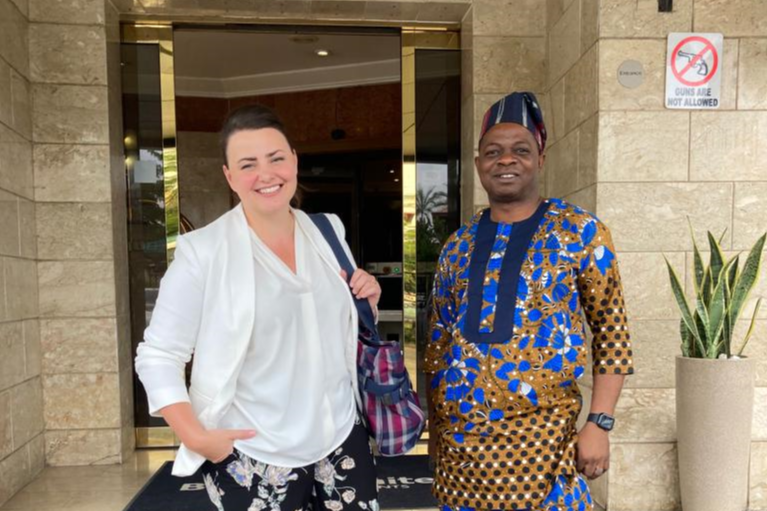
Olufemi Aluko vividly remembers the day his father took him to visit their local hospital in Nigeria. As a young boy still in primary school, he initially wondered why, since he neither felt sick nor had a doctor’s appointment. However, Olufemi soon realized that his father, a schoolteacher, wanted him to witness firsthand the medical professionals hard at work, helping others in their community.
“He made me understand that those people took their education seriously, and that is why they can wear the laboratory coats that they do,” says Aluko, who serves as senior lecturer in the Department of Community Health at Obafemi Awolowo University. “This moment was a key motivator for me to pay more attention to my studies.”
While his father taught him to value education, his mother sparked his interest in food safety and hygiene at an early age. She trained all the children of her household in the basic tenets of food preparation, such as how to pick out quality produce and meat from the market.
Once, Aluko came home with the cheapest items he could find. However, his mother quickly pointed out that the items were spoiled and that eating them would cause the whole family to become ill.
“At that time, my mother told me there are some chemicals that will develop in those spoiled foods — even heating cannot remove them — and eating them could kill any family member,” he recalls.
These two lessons from his parents stayed with him throughout his school years, eventually leading him to pursue an undergraduate degree in microbiology from Obafemi Awolowo University. From there, he received a Master’s and Ph.D. in Public Health with a focus on environmental health science from the University of Ibadan.
His research career has addressed different aspects of disease prevention, including water and sanitation service dimensions, wastewater management, food safety and antimicrobial resistance arising from environmental abuses. For example, recent studies in Nigeria have investigated the association between household water security and diarrheal disease in children; sanitation and hygiene services in a maximum-security correctional facilities; and the parasitic contamination of commonly consumed vegetables such as African eggplant, cucumber and spinach.
In addition, he previously served as a consultant to Akintola Williams Deloite for UNICEF Nigeria, Save the Children International, and WaterAid Nigeria, highlighting best practices in Water, Sanitation, and Hygiene (WASH) service delivery interventions and other key areas. Ongoing endeavors include work on capacity building technical assistance with the Plateau State Water Board, a water supply agency based in east-central Nigeria, and lifecycle assessment of pesticides in farm settlements in southwest Nigeria.
Aluko also brings this public health and hygiene expertise to the “Strengthening household and community food safety in Nigeria” project, funded by the Feed the Future Innovation Lab for Food Safety. The lab is one of 20 such labs in a network under Feed the Future, the U.S. government’s global hunger and food security initiative led by USAID. Household-level food safety is a significant economic and public health concern in his home country. The impact of foodborne pathogens on the development and nutritional status of children under the age of five is of particular concern.
The ongoing project aims to identify strategic actions to mitigate and prevent household foodborne illnesses using a community-driven approach. The researchers are gathering the perspectives of local youth, mothers, primary health care providers, community development personnel, government representatives, academia and civil society leaders to develop community-based solutions.
Aluko joins an interdisciplinary team of scientists from the University of Alaska Fairbanks, Bowen University, the University of Ibadan and Utah State University. He is involved in every facet of the research, from conception and data collection to analysis and report writing. The team is currently conducting environmental sanitation assessments of foodborne pathogens on food contact surfaces and non-food contact surfaces in households in metropolitan Ibadan to identify the scope of the problem.
“I am excited to be part of this particular research with the other collaborators in the United States and Nigeria. The project has pulled us together,” he says. “I have learned a lot in the process, and it has also strengthened my resolve to further contribute to the development or evolution of the food safety sector in Nigeria.”
He emphasizes that Nigeria’s food safety sector, as it stands today, is unstructured and loosely regulated. Looking across the food system, gaps at every step leave households vulnerable to severe foodborne illnesses. Food purchased at the markets will often contain high concentrations of pesticides, herbicides, microorganisms and preservatives that are not permissible under the country’s food safety standards.
Aluko notes that many people involved in food production and preparation are unaware of food safety risks and the practices to reduce them. In particular, for owners of small businesses, the economic pressure to sell enough products to provide for their families may outweigh food safety concerns. Furthermore, foodborne illness prevalence is difficult or even impossible to quantify in Nigeria because many individuals suffering from such conditions will not seek medical treatment.
His overarching goal is to push for system-wide changes so that his fellow citizens — in particular, members of vulnerable populations like children and the elderly — can avoid foodborne disease and malnutrition.
“I want to play a major role in policy reengineering in the food safety sector. There is a need for us to develop a homegrown, appropriate policy that will address multiple challenges across the food chain,” says Aluko. “In this way, I hope that my research will contribute to shaping the food safety and hygiene sector in Nigeria.”
Meeri Kim is a freelance writer with the Feed the Future Food Safety Innovation Lab.

